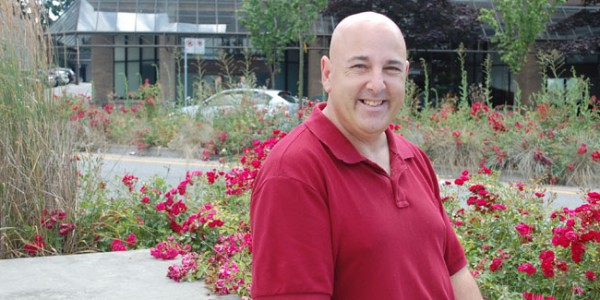New beginnings
When you ask Daniel what would have happened if he didn’t enter the Burnaby Centre in 2009, he answers without hesitation.
“I’d probably still be on the street,” he says. “I’d probably be dead.”
Since he was a teenager growing up in London, Ontario, Daniel suffered from depression. To deal with the illness he eventually turned to crack cocaine and ended up living in a single room occupancy hotel in Vancouver’s Downtown Eastside until finding help at the centre. Vastly different from previous treatment programs he had attended, the Burnaby Centre helped Daniel find emotional, psychological and physical stability, as well as the tools and experiences he needed to move forward.
“When I was on the street, I thought I was happy and didn’t know how low I got,” he says. “I didn’t see it because I couldn’t forgive myself for my past. The Burnaby Centre – and the people there – helped me do that.”
The Burnaby Centre, which recently celebrated its five-year anniversary, offers a completely unique approach to mental health and addiction treatment.
“We decided to take a holistic and strength-based approach to client care, and identified three areas to develop with each client,” says Jane Sun, a registered psychologist at the centre. “To support these areas, we have diverse and dedicated staff who possess unique skill sets and have a shared goal of improving the lives of our clients. We believe it’s unique in that we are able to provide wraparound care to the client as a whole individual, and not just his/her mental health and addiction diagnoses.”
Three areas of focus
The areas that the centre focuses on are:
- Healthy living, which fosters physical health and well-being, promoting healthy mind-body interactions.
- Psychosocial wellness, which strengthens functioning across a wide variety of domains, including emotional, cognitive, behavioural and interpersonal functioning.
- Skills development, which helps clients to build an identity rooted in positive growth.
The areas of attention are addressed through a wide range of engaging – and fun – activities such as yoga and exercise bootcamps, nutrition groups, music therapy and art therapy, which has participants creating works of expression like collages.
For Daniel, the art collages he created to represent his current state of mind were especially helpful. “The collages are geared toward recovery,” Daniel explains. “The words, the images you choose, empower you whenever you look at them.”
While the day-to-day activities may seem unrelated to each other, what they have in common is that they’re all very normal, creating a relaxed environment that promotes healing.
“Traditional approaches don’t always work for everybody,” says Jane. “We’ve found that the greater the variety of programs offered, the greater the chances that a client will connect with a given program and uncover his or her interest, motivation, and self-efficacy with regard to recovery. There are many paths to recovery, and they all involve the identification of, and ability to foster, strength.”
The staff
Daniel says Burnaby-Centre staff were instrumental in showing him how to build meaningful relationships with other people again. This included a particular staff member whom he bonded with over a mutual passion for screenplay writing.
“I found a personal bond, a connection with someone and it made a huge difference in my healing,” he says. “That doesn’t happen very often in a recovery environment.”
Almost four years since going to the Burnaby Centre, Daniel has graduated from Vancouver College of Counsellor Training and is currently working towards his BA from Douglas College. He also volunteers at the centre, mingling with the clients and sharing his experiences and advice with the residents on how to integrate back into normal society.
“It’s called the Burnaby Centre, but I call it the Dream Centre,” says Daniel.” I’m obtaining my dreams and it’s helping others do the same.”

